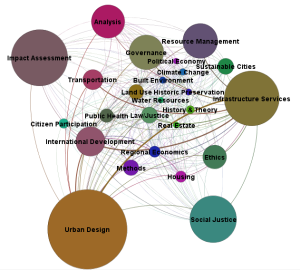 As we know, the field of urban planning is far reaching in breadth and depth. This is due to the complex nature of cities, regions, and associated development patterns. Referring to the ambitious field of urban planning, Aaron Wildavsky famously remarked, “If planning is everything, maybe it’s nothing” (Wildavsky, 1973). Is planning everything? And what does that mean for someone trying to understand planning? Using the recent Guide to Undergraduate and Graduate Education in Urban and Regional Planning (20th Edition, dated 2013) published by the Association of Collegiate Schools of Planning, we examined the question of “what is planning?” by analyzing the areas of expertise and interests for over 900 regular faculty listed in the Guide. These are self-reported areas of teaching and research interests that can be used to characterize contemporary aspects of planning. Rather than just reporting the frequency of topics mentioned across planning faculty, network analysis was used to illustrate the range and interconnections between topics. The results are used to report the knowledge domain of U.S. planning faculty (see the full paper here).
As we know, the field of urban planning is far reaching in breadth and depth. This is due to the complex nature of cities, regions, and associated development patterns. Referring to the ambitious field of urban planning, Aaron Wildavsky famously remarked, “If planning is everything, maybe it’s nothing” (Wildavsky, 1973). Is planning everything? And what does that mean for someone trying to understand planning? Using the recent Guide to Undergraduate and Graduate Education in Urban and Regional Planning (20th Edition, dated 2013) published by the Association of Collegiate Schools of Planning, we examined the question of “what is planning?” by analyzing the areas of expertise and interests for over 900 regular faculty listed in the Guide. These are self-reported areas of teaching and research interests that can be used to characterize contemporary aspects of planning. Rather than just reporting the frequency of topics mentioned across planning faculty, network analysis was used to illustrate the range and interconnections between topics. The results are used to report the knowledge domain of U.S. planning faculty (see the full paper here).
Perspectives on Tom
Professional Affiliation
